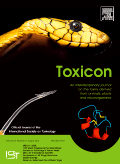
TOXICON
Scope & Guideline
Fostering Knowledge in the Evolving Field of Toxicology
Introduction
Aims and Scopes
- Toxin Mechanisms and Pathophysiology:
Research exploring the biochemical and molecular mechanisms of action of various toxins, including snake venoms, bacterial toxins, and mycotoxins, contributes to understanding their pathophysiological effects on human and animal health. - Clinical Toxicology and Management:
Studies on clinical presentations, management strategies, and therapeutic interventions for toxin exposure, including snakebites and poisoning incidents, help improve patient outcomes and inform clinical practices. - Toxinology and Venom Research:
Focus on the characterization of venom components from various species, including snakes, spiders, and other venomous organisms, to elucidate their pharmacological properties and potential therapeutic applications. - Environmental and Food Toxicology:
Research that addresses the impact of environmental toxins, including mycotoxins, on human health and food safety, aiming to develop mitigation strategies and enhance public health. - Innovative Therapeutics and Antivenoms:
Exploration of novel therapeutic agents, including the development of antivenoms, small molecule inhibitors, and natural products that counteract the effects of toxins.
Trending and Emerging
- Molecular and Genetic Characterization:
There is an increasing trend towards the molecular and genetic characterization of toxins, including studies on the genomics of venomous species and the identification of specific toxin genes. - Mycotoxin Research and Food Safety:
Research on mycotoxins and their effects on food safety and public health is gaining prominence, particularly in relation to their prevalence in agricultural products and potential health impacts. - Neurotoxicology and Neurological Effects of Toxins:
Emerging studies are focusing on the neurotoxic effects of various venoms and toxins, exploring their impact on the nervous system and potential therapeutic applications. - Innovative Drug Development from Toxins:
There is a notable increase in research exploring the potential of toxins as leads for novel therapeutic agents, including anticancer drugs and antimicrobial peptides. - Environmental Impact of Toxins:
Research addressing the environmental consequences of toxins, including cyanotoxins and their effects on ecosystems, has become more prominent as ecological health becomes a priority.
Declining or Waning
- Traditional Antivenom Research:
There seems to be a waning interest in traditional antivenom research as newer methodologies, such as recombinant antivenoms and monoclonal antibodies, gain traction in the field. - General Toxicology Studies:
The journal appears to be shifting away from broad general toxicology studies that do not focus on specific toxins or mechanisms, favoring more targeted studies with clinical relevance. - Insect Venom Research:
Research specifically focused on insect venoms has decreased, possibly due to the increasing interest in more clinically relevant toxins from reptiles and mammals. - Historical Perspectives in Toxinology:
There has been a noticeable reduction in papers focusing on historical aspects of toxinology, as the field moves towards more contemporary and applied research.
Similar Journals

DARU-Journal of Pharmaceutical Sciences
Elevating the discourse in drug discovery and pharmacology.DARU-Journal of Pharmaceutical Sciences is a leading peer-reviewed journal published by SPRINGER INT PUBL AG that focuses on the dynamic and rapidly evolving fields of pharmaceutical sciences, including drug discovery, pharmacology, and toxicology. With an impressive Q2 ranking in both Drug Discovery and Miscellaneous Medicine categories for 2023, this journal stands out as a vital resource for researchers, professionals, and students alike, offering a platform for significant contributions to the scientific community. Covering a comprehensive scope from 2000 to 2024 and indexed by Scopus, the journal ranks within the top percentile in its field, with a ranking of #66/313 in Pharmacology and #34/157 in Drug Discovery, reaffirming its impact and relevance. The journal promotes open access to foster widespread dissemination of knowledge in pharmaceutical sciences, ultimately aiming to bridge the gap between research and clinical applications. For those looking to stay at the forefront of pharmaceutical innovation, DARU represents an invaluable connection to the latest studies and breakthrough findings.
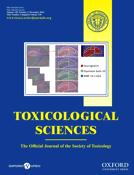
TOXICOLOGICAL SCIENCES
Innovating Understanding in Toxicological SciencesTOXICOLOGICAL SCIENCES, published by Oxford University Press, is a premier journal in the field of toxicology that has been a cornerstone of scientific discourse since its inception in 1981. With an impressive 2023 impact factor and ranked in the Q1 category for Toxicology, this journal is highly regarded among researchers, professionals, and students dedicated to pharmacology and toxicology. The journal is committed to advancing the understanding of toxicological science, covering a breadth of topics that include the mechanisms of toxicity, risk assessment, and the regulatory aspects affecting public health. With an ISSN of 1096-6080 and an E-ISSN of 1096-0929, TOXICOLOGICAL SCIENCES facilitates open access scholarly work, ensuring that critical research reaches a global audience and promotes collaborative learning. As it converges towards 2024, the journal remains pivotal in shaping the future of toxicology research, providing insights that are essential for developing safer chemicals and protecting environmental health.
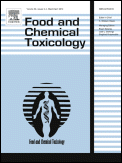
FOOD AND CHEMICAL TOXICOLOGY
Exploring the critical links between food safety and public health.FOOD AND CHEMICAL TOXICOLOGY, published by Pergamon-Elsevier Science Ltd, is a prestigious journal with a significant impact in the fields of food science, medicine, and toxicology, reflecting its Q1 and Q2 quartile rankings in various categories as of 2023. Established in 1982, this journal continues to serve as an essential platform for disseminating high-quality research focused on the toxicological assessment of foods and chemicals, aiming to advance knowledge that affects public health and safety. With a pivotal role in integrating diverse disciplines, including pharmacology and agricultural sciences, the journal ranks impressively within the top percentiles—specifically 95th in Toxicology and 92nd in Food Science on the Scopus metrics. Though it operates on a traditional subscription model, the journal is committed to providing valuable insights and findings to researchers, professionals, and students across the globe, making it a vital resource in the ongoing discourse around food safety and environmental health. Its comprehensive scope underscores its importance in shaping evidence-based policies and practices.

TOXICOLOGY
Fostering dialogue and innovation in toxicological research.TOXICOLOGY, published by Elsevier Ireland Ltd, is a prestigious peer-reviewed journal specializing in the field of toxicology. With an ISSN of 0300-483X and an E-ISSN of 1879-3185, this journal provides a vital platform for researchers, professionals, and students to disseminate and access groundbreaking studies from 1973 to present, with a convergence set until 2024. Recognized for its high impact, it holds a Q1 ranking in Toxicology category and ranks #18 out of 133 in Scopus's sector of Pharmacology, Toxicology, and Pharmaceutics, placing it in the 86th percentile. While the journal is not open access, it nonetheless offers a rich collection of research articles that enhance the understanding of toxicological science and its applications. The journal's objectives encompass advancing knowledge in the toxicological evaluation of substances, promoting safety in public health, and fostering dialogue among scholars. As a key resource in the field, TOXICOLOGY plays a crucial role in advancing research and informing practices related to toxicological risks and safety assessments.
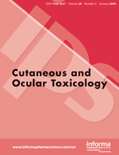
Cutaneous and Ocular Toxicology
Pioneering research in cutaneous and ocular toxicology.Cutaneous and Ocular Toxicology, published by Taylor & Francis Ltd, is an essential resource in the fields of toxicology and pharmacology, focusing specifically on the effects of substances on the skin and eyes. With an ISSN of 1556-9527 and an E-ISSN of 1556-9535, this journal has been a vital platform for disseminating research since its inception in 1982, continuing its contributions to the scientific community through to 2024. Recognized for its academic rigor, it currently holds a Q3 ranking in the Medicine (miscellaneous) and Toxicology categories, reflecting its value among researchers and practitioners. The open access option enhances the journal's visibility and allows wider dissemination of knowledge, making it a key resource for professionals, students, and researchers dedicated to understanding and mitigating toxicological effects. Situated in the United Kingdom, Cutaneous and Ocular Toxicology strives to foster interdisciplinary collaboration and elevate the standards of toxicological research.
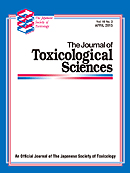
JOURNAL OF TOXICOLOGICAL SCIENCES
Fostering Collaboration in Toxicological ResearchThe Journal of Toxicological Sciences, published by the Japanese Society of Toxicological Sciences, is a prominent academic journal dedicated to the comprehensive study of toxicology and its related fields. Since its inception in 1976, the journal has provided a vital platform for researchers and professionals to disseminate innovative findings and insights in toxicology, with a focus on both experimental and clinical studies. Positioned in the Q3 quartile across various relevant categories, including Medicine (miscellaneous) and Toxicology as of 2023, the journal plays an essential role in advancing our understanding of toxic substances and their effects on biological systems. Although currently not open access, the journal maintains high academic standards and is indexed in Scopus, ranking #96 in Toxicology. Offering unique perspectives from Japan, it encourages global collaboration and discourse among toxicologists, making it an invaluable resource for students, researchers, and industry professionals alike.
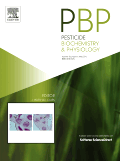
Pesticide Biochemistry and Physiology
Advancing sustainable agriculture through innovative pesticide research.Pesticide Biochemistry and Physiology, published by Academic Press Inc Elsevier Science, is a prominent peer-reviewed journal dedicated to advancing knowledge in the fields of agronomy, crop science, and the toxicological effects of pesticides. With an established history since 1971, this journal aims to provide a platform for researchers and professionals to share groundbreaking studies that bridge the gap between agricultural practices and environmental health. Holding a remarkable Q1 ranking in both Agronomy and Crop Science as well as Health, Toxicology, and Mutagenesis, it reflects the journal's commitment to high-quality research. The journal is essential reading for anyone involved in the sustainability of agricultural ecosystems, offering insights into the biochemical interactions of pesticides and their physiological impacts on various crops and non-target organisms. As the global demand for sustainable agricultural practices escalates, Pesticide Biochemistry and Physiology remains at the forefront, promoting innovative research to ensure both food security and environmental safety. Converged through an extensive range of studies, this journal is a valuable resource for researchers, professionals, and students aiming to make significant contributions to the evolving landscape of pesticide biochemistry.
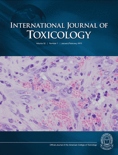
INTERNATIONAL JOURNAL OF TOXICOLOGY
Bridging Research and Practice in Toxicology.The International Journal of Toxicology, published by SAGE Publications Inc, serves as a cornerstone of scholarly research in the field of toxicology, with an established history dating back to 1982. This esteemed journal, ISSN 1091-5818 and E-ISSN 1092-874X, functions within the Q3 quartile in Toxicology, ranking 94 out of 133 in the Pharmacology, Toxicology and Pharmaceutics category per Scopus metrics, reflecting its commitment to advancing scientific understanding in this critical area. The journal not only aims to disseminate high-quality research but also encourages open access to vital studies, thus fostering collaboration and innovation among researchers, professionals, and students alike. With a focus on various aspects of toxicology, including but not limited to environmental, clinical, and molecular toxicology, the International Journal of Toxicology is dedicated to bridging gaps in toxicity research and promoting safe practices across numerous disciplines. As it converges towards 2024, the journal continues to play a vital role in shaping the discourse surrounding the implications of exposure to toxic substances in human health and the environment.
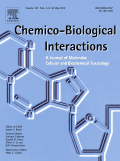
CHEMICO-BIOLOGICAL INTERACTIONS
Unraveling Complex Interactions for Health InnovationsCHEMICO-BIOLOGICAL INTERACTIONS is a premier journal published by Elsevier Ireland Ltd, dedicated to advancing the field of chemical and biological interactions since its inception in 1969. With a robust focus on pharmacology and toxicology, the journal holds a prestigious Q1 ranking in both Medicine (miscellaneous) and Toxicology, reflecting its significance in disseminating influential research. As part of the Scopus database, it ranks #21 out of 133 journals in Toxicology, positioning it in the 84th percentile and ensuring high visibility for cutting-edge studies. This scholarly platform serves as a crucial resource for researchers, professionals, and students who seek reliable and innovative findings at the intersection of chemistry and biology. While currently not open access, CHEMICO-BIOLOGICAL INTERACTIONS provides a comprehensive collection of articles that contribute to the ongoing dialogue in toxin research and its implications on medicinal chemistry, thereby fostering advancements in public health and safety.
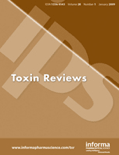
Toxin Reviews
Empowering Science Through Open Access ResearchToxin Reviews is a premier academic journal focused on the critical field of Toxicology, published by Taylor & Francis Inc. Established with an aim to foster research and disseminate knowledge, this journal has been pivotal since its inception in 1982 and continues to be a leading platform for both emerging and established researchers. With an impressive impact factor and ranked in the 75th percentile among its peers in the Scopus categories, it serves as an essential resource for scientists, practitioners, and students interested in understanding the complexities of toxins and their effects on health. The journal provides an Open Access platform, enhancing visibility and accessibility of research findings to a broader audience. Covering a wide scope, Toxin Reviews plays a vital role in bridging gaps between toxicological research and practical applications, ensuring that rigorous scientific inquiry translates into real-world solutions.